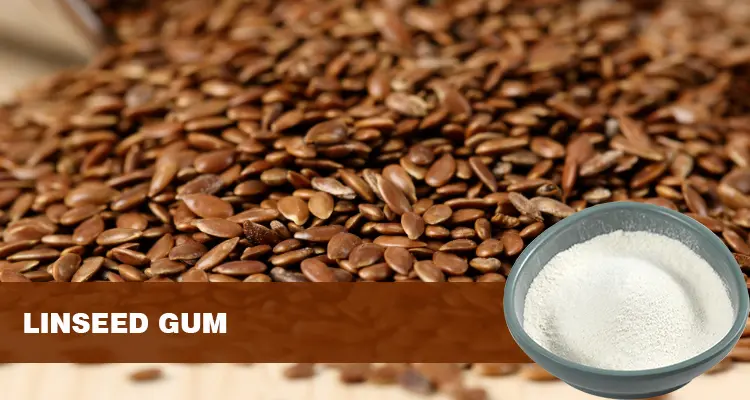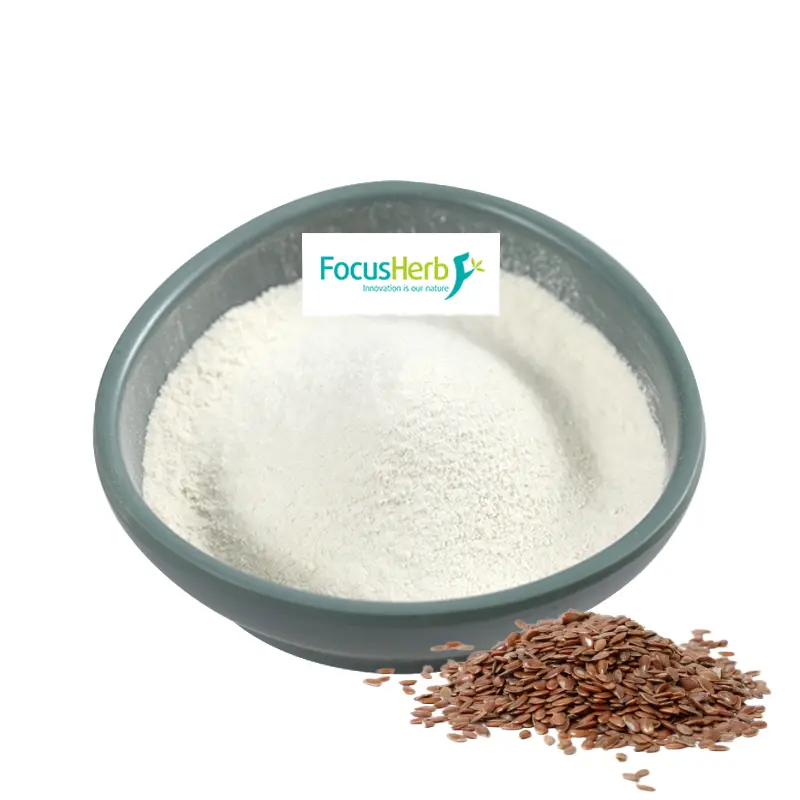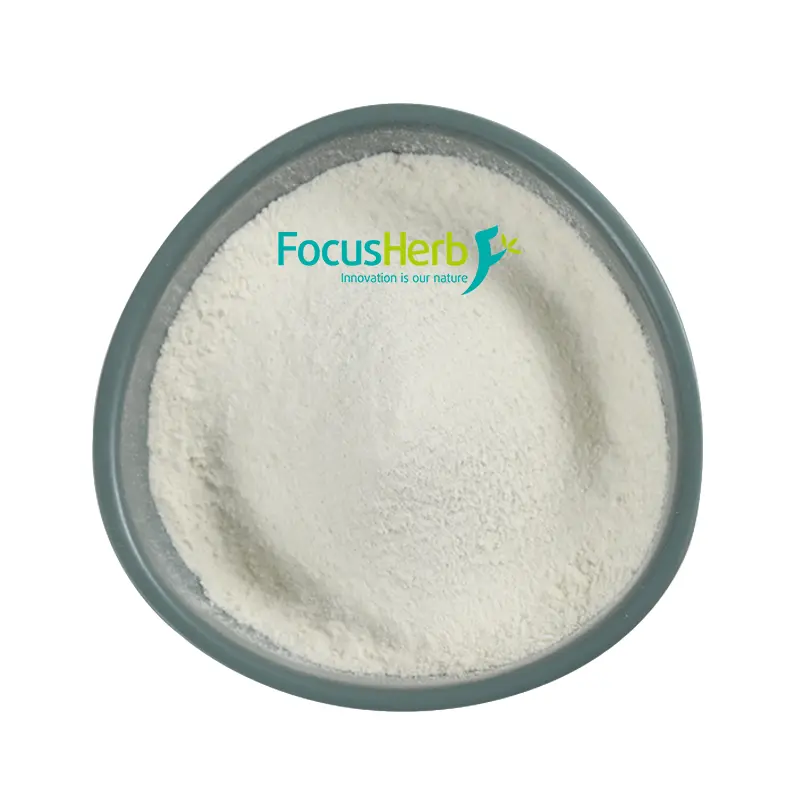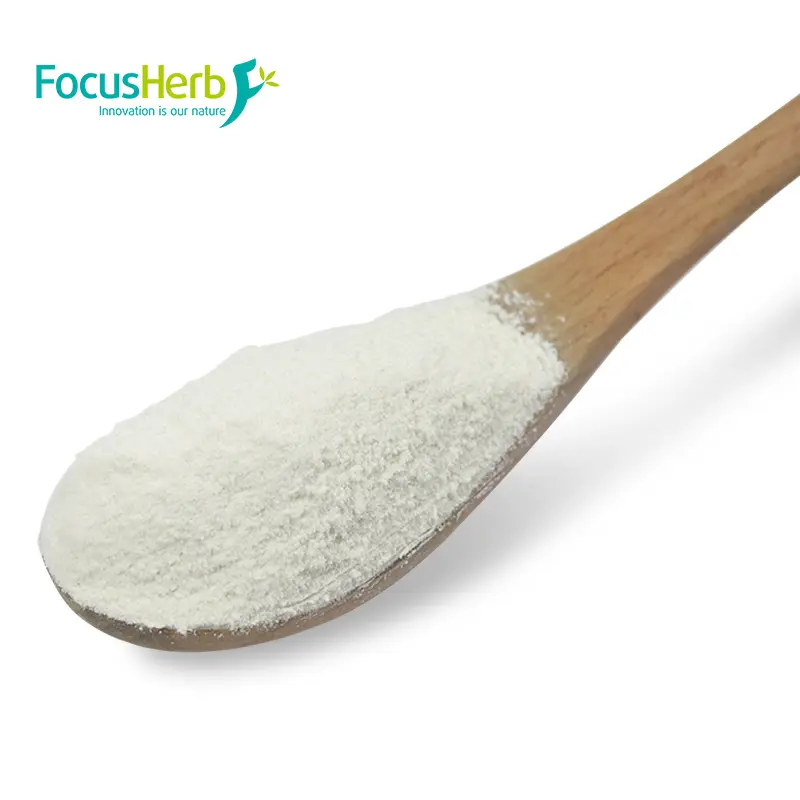In today’s pursuit of a healthier lifestyle, people’s focus on food has shifted from simply taste and satiety to a deeper exploration of its nutritional and functional properties. Flaxseed Gum, a natural ingredient derived from flaxseed, has quietly evolved from a traditional food additive to become a research hotspot in the health field, thanks to its unique polysaccharide structure and bioactivity. Flaxseed gum not only improves food texture and stability but also demonstrates significant potential for intestinal health, metabolic regulation, immune protection, and other aspects, offering new perspectives and options for modern health management.
Core Health Functions: Systemic Regulation from the Intestines to the Whole Body
Guardian of Intestinal Health
Lubricates the Intestines and Improves Intestinal Motility
Constipation, a global intestinal problem, is becoming a hidden threat to quality of life. According to the World Health Organization (WHO), approximately 16% of adults worldwide suffer from constipation, and this rate rises as high as 33% among the elderly. Flaxseed gum, as a natural intestinal motility booster, offers new hope for those suffering from constipation. Its rich content of water-soluble dietary fiber acts like a “sponge” in the intestines. Upon contact with water, it rapidly expands to form a highly viscous gel. This gel not only adds bulk to stool, making it softer and easier to pass, but also acts like a gentle massager, stimulating intestinal peristalsis and significantly shortening bowel movement. Clinical studies have strongly confirmed this benefit of flaxseed gum. A daily intake of 5-10g of flaxseed gum can increase bowel movement frequency by 30% in constipated patients, restoring a sense of smooth bowel movement.
Regulating the Intestinal Microbiome and Building a Balanced Microbiome
Our intestines are home to trillions of microorganisms, forming a complex and delicate ecosystem known as the intestinal microbiome. This small ecosystem plays a vital role in our health, from nutrient digestion and absorption to immune system regulation. However, factors such as poor dietary habits and long-term antibiotic use in modern life often disrupt this ecological balance, leading to the proliferation of harmful bacteria and a decrease in beneficial bacteria, causing various intestinal problems. Flaxseed gum is like a wise ecosystem manager. As a prebiotic, it specifically provides a rich “food” for beneficial bacteria like Bifidobacteria and Lactobacilli, helping them thrive while inhibiting the overgrowth of harmful bacteria like Escherichia coli. In vitro studies have shown promising results, showing that flaxseed gum promotes the production of short-chain fatty acids, such as butyrate and acetic acid. These short-chain fatty acids are not only a vital energy source for intestinal cells, but also strengthen the intestinal barrier function and reduce the risk of intestinal inflammation. For those experiencing dysbiosis caused by antibiotic use, flaxseed gum is an ideal choice for restoring the balance of the intestinal microbiome.
Protects the Intestinal Mucosa and Relieves Digestive Discomfort
Common digestive tract diseases such as gastritis and gastric ulcers often cause patients to suffer from symptoms such as heartburn and nausea. Flaxseed gum, with its unique viscosity, forms a tough, physical protective layer on the surface of the gastric mucosa, acting like a protective layer, effectively reducing damage from irritants like gastric acid and alcohol. This protective layer not only relieves inflammation but also provides a favorable environment for the repair of damaged mucosa, helping to alleviate the various discomforts caused by gastritis and gastric ulcers, restoring comfort and peace to the digestive tract.
A Natural Aid in Metabolic Regulation
1. Blood Sugar Regulator: Delaying Sugar Absorption
Globally, the incidence of diabetes is increasing at an alarming rate, becoming a major public health issue threatening human health. According to the International Diabetes Federation (IDF), the number of people with diabetes worldwide reached 537 million in 2021, and this number is projected to reach 783 million by 2045. For people with diabetes, controlling blood sugar levels is a long and arduous battle. Flaxseed gum, as a natural blood sugar regulator, provides powerful support in this battle. It slows gastric emptying, allowing food to remain in the stomach longer, thereby slowing the rate at which sugar enters the bloodstream. It also inhibits α-amylase activity, reducing starch breakdown and further reducing post-meal blood sugar spikes. Animal studies have shown encouraging results. Adding 0.7% flaxseed gum to the diet of diabetic rats reduced postprandial blood glucose levels by 25%, making flaxseed gum an ideal supplemental ingredient in the dietary management of diabetic patients.
2. Blood Lipid and Cholesterol Management: Dual Regulatory Mechanisms
High blood lipids, a significant risk factor for cardiovascular disease, are gaining increasing attention. Excessive levels of triglycerides and low-density lipoprotein (LDL-C) in the blood act like “garbage” in the blood vessels, gradually accumulating on the vessel walls and forming atherosclerotic plaques, increasing the risk of cardiovascular and cerebrovascular diseases. Flaxseed gum, acting as a “scavenger” for the blood vessels, helps maintain healthy blood lipid and cholesterol levels through a dual regulatory mechanism. On the one hand, it binds tightly to bile acids, promoting intestinal cholesterol excretion and reducing bile acid reabsorption, thereby lowering blood cholesterol levels. On the other hand, it inhibits intestinal absorption of dietary fat, lowering blood triglyceride levels. Human trials have shown that consuming 10g of flaxseed gum daily can reduce total cholesterol by 8%-12%. This significant effect is particularly beneficial for those with high blood lipids, safeguarding their health.
3. Aids Weight Management: Low Calories, High Satiety
In an era of pursuit of health and beauty, weight management has become a focus for many. However, the hunger pangs and cravings that come with dieting often derail weight loss plans. Flaxseed gum, as a natural weight management aid, offers a scientific and healthy approach. Its high fiber content quickly absorbs water and swells upon entry, creating a lasting feeling of fullness, allowing us to enjoy delicious food while reducing our intake of regular meals. Furthermore, flaxseed gum has an extremely low energy density, adding virtually no additional caloric burden to the body. Animal studies have shown that supplementing with flaxseed gum can effectively inhibit obesity induced by a high-fat diet and reduce adipose tissue accumulation, allowing us to achieve our weight management goals in a relaxed and enjoyable manner.
Immunity and Antioxidant Protection
1. Nutrient Carrier: Multi-nutrient Supplementation
In the fast-paced modern world, people often suffer from nutrient deficiencies due to unbalanced diets and high work pressure, which in turn affects their immunity. Flaxseed gum, a nutrient-rich natural substance, is a treasure trove of nutrients, rich in linoleic acid, vitamin E, minerals such as calcium, iron, and zinc, and various amino acids, among other essential nutrients. These nutrients work synergistically to support normal body function and enhance immunity. For those experiencing malnutrition or recovering from surgery, flaxseed gum is an ideal nutritional supplement, helping them quickly recover and boosting immunity.
2. Antioxidant Stress: Eliminating Free Radical Damage
With aging and the effects of external factors such as environmental pollution and ultraviolet radiation, our bodies continuously produce free radicals. These free radicals act as disruptors within the body, damaging cellular DNA and membranes, triggering oxidative stress, accelerating the aging process, and increasing the risk of various diseases, including cardiovascular disease and neurodegenerative disorders. Flaxseed gum, with its potent antioxidant capacity, is a “killer” of free radicals. It effectively scavenges free radicals in the body by chelating metal ions and inhibiting lipid peroxidation. In vitro data show that flaxseed gum has a superoxide anion scavenging rate of up to 72.93%, significantly reducing free radical damage to cells, delaying aging, and providing a strong defense against aging.
Special Physiological Functions: Heavy Metal Chelation and Barrier Protection
1. Promotes Lead Excretion: Heavy Metal Detoxification
In the process of modern industrialization, environmental pollution is becoming increasingly serious, and heavy metal pollution has become a major threat to human health. Once heavy metals such as lead and mercury enter the human body, they accumulate and cause serious damage to the nervous system, blood system, and other organs. Flaxseed gum, with its unique polysaccharide structure, contains galacturonic acid groups that act like “claws,” specifically binding to heavy metal ions like lead and mercury, forming stable complexes that are excreted in feces, thereby reducing the risk of heavy metal accumulation in the body. For those chronically exposed to environmental pollution, flaxseed gum is undoubtedly a powerful daily defense.
2. Skin Health Support: Internal and External
Skin, the body’s largest organ, is not only a showcase for our outward appearance but also a vital barrier protecting our internal tissues and organs. With aging, increased stress, and environmental irritation, skin often develops dryness, dullness, and loss of elasticity. Flaxseed gum offers unique benefits for skin health, serving as a “guardian” of the skin. When taken internally, the antioxidants in flaxseed gum inhibit melanin production, reducing the formation of dark spots, while promoting collagen synthesis and increasing skin elasticity for a healthy glow. When applied topically, it acts as a natural moisturizer, forming a thin protective film on the skin’s surface, strengthening the barrier function of the stratum corneum, reducing water loss, and keeping the skin hydrated and smooth. For those suffering from dry dermatitis and photoaging, flaxseed gum has tremendous potential for repair, offering new hope for improving skin conditions.
An In-Depth Analysis from Molecular Structure to Physiological Effects
(I) Physical Properties: The Functional Basis of Viscous Gel
The unique health benefits of flaxseed gum stem from its complex and sophisticated molecular structure and physical properties. At the molecular level, flaxseed gum is primarily composed of acidic and neutral polysaccharides. The backbone comprises various monosaccharides, such as xylose and galacturonic acid, interconnected by 1,4- and 1,6-glycosidic bonds, forming a highly hydrophilic network. When flaxseed gum comes into contact with water, these hydrophilic groups rapidly bind to water molecules, causing it to expand rapidly and form a highly viscous gel. This physical property is the key foundation for flaxseed gum’s numerous physiological functions.
In the intestines, the viscous gel formed by flaxseed gum performs multiple functions. It acts as a lubricant, increasing the moisture and bulk of stool, facilitating easier passage through the intestines and effectively preventing and relieving constipation. Furthermore, the gel forms a protective barrier on the intestinal mucosa, preventing harmful substances from coming into direct contact with the mucosa, reducing inflammation, and protecting the integrity of the mucosa. Flaxseed gum’s thickening and emulsifying properties are also being fully utilized in food systems. It can increase food viscosity, enhance food stability, prevent food separation and sedimentation, and improve food taste and texture, making it a valuable additive in a wide range of food products, including dairy products, meat products, and beverages.
(II) Biological Activity: Interactions between Polysaccharides and the Intestine
In addition to its physical properties, flaxseed gum possesses a wealth of biological activities, enabling complex interactions with intestinal cells and microorganisms, thereby comprehensively regulating health. Studies have found that flaxseed gum can activate intestinal endocrine cells (L cells), prompting them to secrete GLP-1 (glucagon-like peptide-1). GLP-1 is an important intestinal hormone that regulates glucose and lipid metabolism through multiple pathways. On the one hand, GLP-1 can stimulate insulin secretion and increase insulin sensitivity, thereby lowering blood sugar levels. On the other hand, it can inhibit gastric emptying, reduce appetite, and reduce energy intake, thereby aiding weight management. Clinical studies have shown that consuming foods rich in flaxseed gum significantly increases blood GLP-1 levels and significantly improves postprandial blood sugar and insulin responses.
Flaxseed gum also has a positive regulatory effect on the intestinal immune system. It stimulates immune cells in the intestine, enhancing their activity and boosting intestinal immunity. Flaxseed gum also promotes mucus secretion by goblet cells, which not only lubricates the intestine but also forms a physical barrier to prevent pathogen invasion and protect the intestine from infection. For those with dysbiosis, flaxseed gum can help restore the balance of the intestinal microbiome by regulating the composition and metabolism of intestinal microbes, promoting the growth of beneficial bacteria and inhibiting the proliferation of harmful bacteria.
Diverse Practices from Food to Health
(I) Functional Food Additives
1. Dietary Supplements: A New Choice for Healthy Foods
Amid the wave of innovation in healthy foods, flaxseed gum, thanks to its unique physical and chemical properties and health benefits, has become a favorite among many food companies and is widely used in various dietary supplement products. Adding an appropriate amount of flaxseed gum to yogurt not only makes the yogurt thicker, creamier, and smoother, but also increases the dietary fiber content, allowing consumers to enjoy a delicious flavor while also benefiting from better intestinal health. Some brands have introduced probiotic yogurts enriched with flaxseed gum, combining the prebiotic effects of flaxseed gum with the intestinal regulating properties of probiotics to provide consumers with more comprehensive intestinal health care.
Flaxseed gum also proves useful in snack foods such as jelly. It not only replaces traditional gelling agents, giving jelly greater elasticity and toughness, but also imparts certain health benefits, making snacks a healthy alternative. Flaxseed gum is also increasingly used in meat products. For example, adding flaxseed gum to products like ham and sausage improves water retention and stability, reduces fat release, and reduces the starchiness of the sausage. It also increases dietary fiber content, making the meat products healthier and more nutritious.
To meet the modern consumer’s demand for convenient nutritional supplements in their fast-paced lives, flaxseed gum is also available in solid beverages or meal replacement powders. These products are typically rich in various nutrients, such as protein, dietary fiber, vitamins, and minerals, providing a quick boost of energy and nutrition. Flaxseed gum thickens, stabilizes, and enhances nutrition, improving solubility and taste. Some brands of meal replacement powders incorporate flaxseed gum, which not only increases satiety but also helps regulate blood sugar and lipid levels, making it an ideal choice for dieters and those seeking a healthier diet.
2. Special Dietary Applicants: Targeted Adaptation
For special populations, such as those with diabetes, those with high blood lipids, and infants, flaxseed gum, due to its natural safety and unique health benefits, is a preferred ingredient in special diets. For people with diabetes, controlling blood sugar is a top priority. Flaxseed gum, with its low glycemic index (GI), can slow the digestion and absorption of carbohydrates, effectively controlling the rise in blood sugar after a meal. Some food companies have developed low-GI foods, such as bread and biscuits, that incorporate flaxseed gum, offering healthier options for people with diabetes. These products not only taste good but also help them better manage their blood sugar levels and improve their quality of life.
People with high blood lipids are at risk for cardiovascular disease and need to strictly control their blood lipid levels. Flaxseed gum can lower blood cholesterol and triglyceride levels, reducing the risk of cardiovascular disease. Therefore, flaxseed gum is widely used in low-fat foods for people with high blood lipids. Some brands have introduced flaxseed gum-enriched oatmeal, nut bars, and other products. These products are not only rich in dietary fiber and healthy fats, but also effectively lower blood lipids, making them an ideal daily choice for people with high blood lipids.
Flaxseed gum also plays an important role in infant formula. As a natural prebiotic, flaxseed gum can promote the growth of beneficial bacteria in infants’ intestines, regulate intestinal flora balance, and enhance intestinal immunity. Some infant formula and complementary foods contain an appropriate amount of flaxseed gum to help establish a healthy intestinal microecological environment and promote nutrient digestion and absorption. Flaxseed gum can also improve the stability and taste of formula foods, making them more suitable for infants and young children.
(II) Health Products and Pharmaceuticals
1. Dietary Supplements: Diversified Dosage Forms
With increasing health awareness, the dietary supplement market is booming. Flaxseed gum, as a natural health ingredient, is also emerging in the dietary supplement sector. Currently, flaxseed gum is available directly as a dietary supplement in capsules and tablets, making it convenient for consumers to take. These products typically undergo rigorous production processes and quality control to ensure the purity and activity of the flaxseed gum. Consumers can choose the appropriate flaxseed gum dietary supplement for their daily needs. To meet the needs of diverse consumers, flaxseed gum is often combined with other nutrients, such as probiotics and vitamins, to develop multifunctional dietary supplements. Some products combine flaxseed gum with probiotics to regulate intestinal flora, promote intestinal motility, and improve intestinal health. Others combine flaxseed gum with antioxidants such as vitamin C and vitamin E to enhance its antioxidant capacity, helping consumers fight free radical damage and slow aging. These combined products offer comprehensive nutritional support, meeting the health needs of diverse populations and are highly sought after by consumers.
2. Medical Aids: Potential Clinical Value
In the pharmaceutical field, flaxseed gum’s gelling properties hold great potential as a drug carrier. Research has shown that flaxseed gum can serve as a sustained-release carrier for drugs, controlling their release rate, prolonging their duration of action, and enhancing their efficacy. Formulating flaxseed gum into microspheres or nanoparticles and encapsulating drugs within them allows for targeted drug delivery, minimizing damage to normal tissues. This novel drug delivery system offers new insights and approaches for drug development and treatment, and holds broad application prospects.
Flaxseed gum also demonstrates unique advantages in wound repair. It forms a protective film on the wound surface, protecting it from bacterial infection and promoting wound healing. For patients with oral ulcers, lozenges containing flaxseed gum can relieve pain and promote ulcer healing. For patients undergoing gastrointestinal surgery, flaxseed gum preparations can protect the gastrointestinal mucosa, reduce inflammation, and promote wound repair. The use of flaxseed gum in wound repair provides a safe and effective adjunct to clinical treatment.
Safety and Scientific Intake Recommendations
(I) Suitable Populations and Contraindications
1. Recommended Use
Flaxseed gum’s numerous health benefits make it an ideal choice for maintaining health for many people. For those suffering from chronic constipation, flaxseed gum’s laxative properties can effectively improve intestinal function and facilitate smoother bowel movements. Diabetics and those with hyperlipidemia can benefit from flaxseed gum’s blood sugar and lipid-regulating effects, helping them better manage their conditions and reduce the risk of complications. For those with intestinal dysbiosis caused by long-term antibiotic use or poor dietary habits, flaxseed gum can help regulate their intestinal flora and restore a balanced intestinal microbiome. For those living in areas with severe environmental pollution, flaxseed gum’s heavy metal chelation properties can help eliminate heavy metals from their bodies, reducing the health risks of pollution. For those pursuing a healthy diet and valuing a balanced diet, flaxseed gum is a natural and healthy food additive that can add nutrition and functionality to their diet.
2. Precautions
While flaxseed gum offers numerous health benefits, it’s not suitable for everyone to consume in large quantities. For people with weak spleens and stomachs, excessive intake of flaxseed gum may cause indigestion symptoms such as bloating and diarrhea due to their relatively weak digestive function. Therefore, it is recommended that such people limit their daily flaxseed gum intake to less than 15g and carefully monitor their body’s reactions. People with allergies should exercise caution when consuming flaxseed gum. Although flaxseed gum allergies are relatively rare, some people may be allergic to certain components in flaxseed. When first consuming foods containing flaxseed gum, it is important to try a small amount and observe for allergic reactions such as rash, itching, or difficulty breathing. If allergic symptoms occur, discontinue consumption immediately and seek medical attention.
(II) Usage Instructions
To fully realize the health benefits of flaxseed gum, proper consumption is crucial. It is recommended that flaxseed gum be consumed with meals. This allows it to mix better with food, slowing gastric emptying and promoting a sense of fullness, while also facilitating nutrient absorption. When consuming flaxseed gum, it is important to consume it with plenty of water to help it form a gel in the intestines, providing a laxative effect. Generally speaking, it’s recommended to drink 200-300ml of water for every gram of flaxseed gum consumed.
There are many simple ways to incorporate flaxseed gum into your daily diet. When cooking oatmeal or millet porridge, add a small spoonful of flaxseed gum to not only thicken the porridge but also enrich its taste and nutritional value. When making baked goods like bread and cookies, adding a moderate amount of flaxseed gum improves the texture, making it softer and more delicious while also increasing the dietary fiber content. Flaxseed gum can be mixed with yogurt or salad dressing to create a healthy dip for fruits and vegetables, adding both flavor and nutrition.
Future Outlook: From Natural Ingredients to Precision Health Solutions
With in-depth research into structural modifications of flaxseed gum (such as oligosaccharide degradation and metal ion chelation), its potential for applications in targeted delivery and disease prevention will be further unlocked. Combining synthetic biology and nanotechnology to develop highly bioavailable functional formulations is expected to elevate flaxseed gum from a food additive to a core ingredient for lifecycle health management, providing a new path for precision nutrition and personalized health care.
In the food sector, flaxseed gum is poised to develop in a greener and more efficient direction. Researchers will continue to explore new extraction technologies to improve the extraction rate and purity of flaxseed gum and reduce production costs. The application of flaxseed gum in novel food systems will also become a research hotspot. For example, in plant-based foods and 3D-printed foods, flaxseed gum is expected to play a unique role in improving food texture and taste, and enhancing its nutritional value.
In the pharmaceutical field, research on flaxseed gum as a drug carrier will continue to deepen. By structurally modifying flaxseed gum, it can better load drugs, achieving precise delivery and controlled release, improving drug efficacy, and reducing side effects. Flaxseed gum’s applications in tissue engineering and regenerative medicine are also promising, providing new avenues for disease treatment and recovery.
In the healthcare sector, flaxseed gum will be deeply integrated with other natural ingredients to develop more synergistic health products. Combining probiotics and prebiotics with other ingredients could lead to the development of products that comprehensively regulate the intestinal microbiome. Combining them with antioxidants, vitamins, and other ingredients could lead to the development of products with enhanced antioxidant and immune-modulating properties. As demand for health management continues to grow, the market prospects for flaxseed gum in the healthcare sector are expected to expand.























